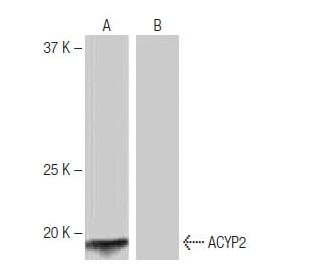

Anticorps ACYP2 (2B4): sc-134247
- L'Anticorps ACYP2 (2B4) est un monoclonal de souris IgG1 (chaîne légère kappa) fourni en 100 µg/ml
- élevé contre la protéine recombinante ACYP2 d'origine human.
- recommandé pour la détection de ACYP2 d'origine human par WB, IP et ELISA
- Nous testons actuellement encore nos anticorps secondaires pour trouver la meilleure protéine de liaison pour cet anticorps primaire ACYP2 (2B4). Veuillez nous contacter si vous avez des questions concernant les réactifs de détection secondaire appropriés.
ACCÈS RAPIDE AUX LIENS
The formation of stable highly organized protein aggegrates, known as amyloid fibrils, is associated with several debilitating human diseases, including Alzheimer's disease, Parkinson's disease, and Creutzfeldt-Jakob disease. In each of these conditions, a peptide or protein that is normally soluble accumulates into insoluble fibrils. Muscle acylphosphatase (ACYP2) has emerged as a significant model system to study protein misfolding and aggregation. It is particularly suitable for these studies because muscle acylphosphatase is a small, simple protein of only 98 amino acids consisting of a five-stranded antiparallel β-sheet and two parallel α-helices. Mutations in ACYP2 between residues 16-31 and 87-98, which includes its phosphate binding site at Arg 23, significantly increases the rate of aggregation. These mutations correlate with changes in the hydrophobicity of ACYP2 and a conversion of the α-helical structures to β-sheets. Therefore, a reduction in the net charge of a protein may be a key determinant in some forms of protein deposition diseases.
Informations pour la commande
| Nom du produit | Ref. Catalogue | COND. | Prix HT | QTÉ | Favoris | |
Anticorps ACYP2 (2B4) | sc-134247 | 100 µg/ml | $339.00 |

